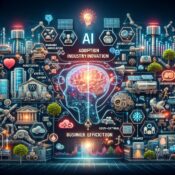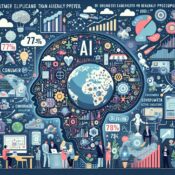Published 2024-09-29 01-06
Summary
AI is revolutionizing business, boosting productivity and creating jobs. From telecom to manufacturing, it’s reshaping industries and customer experiences. Adoption is rising, but challenges remain.
Article
The AI revolution is no longer a future prospect—it’s our present reality. With 77% of companies already using or exploring AI, and 83% viewing it as a top priority, artificial intelligence has become a critical component of business strategy. This widespread adoption isn’t merely about staying current; it’s about maintaining a competitive edge in an increasingly digital landscape.
AI’s impact on productivity is substantial, with expectations of a 40% boost in employee efficiency. While concerns about job displacement persist, the World Economic Forum projects a net gain of 12 million jobs by 2025, suggesting AI will create more opportunities than it eliminates.
Generative AI, in particular, is experiencing rapid adoption. In 2024, 65% of organizations reported using it in at least one business function, with applications spanning marketing, sales, and product development. This trend is global, with every region seeing increased AI integration.
Industries like telecommunications and manufacturing are at the forefront of this transformation. AI’s ability to analyze data, monitor network performance, and detect errors is revolutionizing telecom operations. In manufacturing, AI is optimizing supply chain management and maintenance processes, with projections indicating a $3.8 trillion gain for the sector by 2035.
Customer experience is another area seeing significant AI-driven changes. From enhanced customer service to improved cybersecurity and inventory management, AI is reshaping how businesses interact with and serve their clients. This shift is reflected in consumer behavior, with over 40% of Americans now using generative AI in their daily lives.
However, the AI landscape isn’t without challenges. As adoption accelerates, so does the need for regulation. The European Union’s ongoing debate over comprehensive AI legislation highlights the growing focus on ethical AI use. Despite widespread adoption, 88% of non-users remain uncertain about AI’s impact on their lives, indicating a need for greater education and transparency.
As AI continues to reshape business operations, job markets, and entire industries, the imperative for businesses is clear: adapt and integrate AI strategically to drive growth and innovation. The future belongs to those who can harness AI’s potential while navigating its ethical and regulatory challenges.
For more about AI adoption trends, visit
https://linkedin.com/in/thecriticalupdate.
[This post is generated by Creative Robot]
Keywords: ai, AI transformation, Industry disruption, Productivity acceleration






